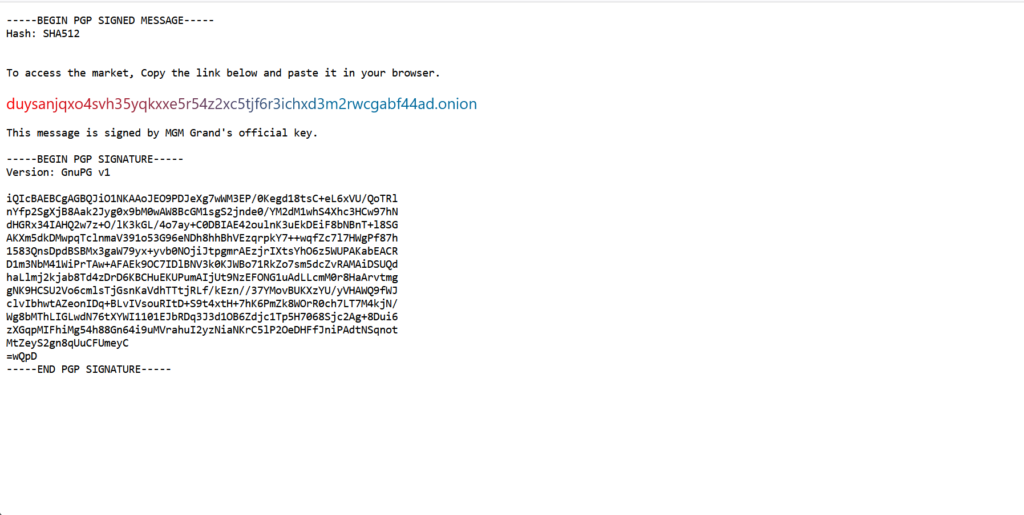Table of Contents
Togglemgm market – TOR Scam Report (1)
Onion Link: http://ngemgrlhmdqi3zsgscjgjrbwpietxf3kbwjfzrarb4h6f3nimjsiu7yd.onion
Scam Report Date: 2024/05/24
Client Scam Report Breakdown
Original Report Summary:
The client reports that after sending $40 to a wallet address provided on their user page, they encountered communication issues with the support team of the platform. According to the client, every attempt to contact support resulted in failed messages, either not being delivered or receiving no response. The error message received repeatedly was “miss token,” which the client claims is not a valid error, as they verified the token multiple times before sending the funds.
This section summarizes the main issue from the original report. It highlights the amount sent ($40) and identifies that the issue arises from both a potential wallet malfunction and lack of responsive customer support. The term “wallet” in this context refers to a digital cryptocurrency wallet, a tool that allows users to store and manage digital assets like Bitcoin or Ethereum. The “link they gave me” refers to the specific wallet address generated for the client to send funds to, a common feature on digital platforms that facilitates financial transactions. The error “miss token” may refer to an invalid or missing authentication string, commonly used in cryptocurrency platforms to confirm the validity of a transaction or session. Here, the client suggests that this error is incorrectly being reported by the system.
Photos:

Detailed Analysis of the Scam Mechanism: The report suggests two primary issues: an unreliable platform mechanism and poor customer service. First, the client’s funds appear to have been sent to a wallet address provided by the platform without proper transaction validation, resulting in lost funds or an untraceable payment. The term “transaction validation” refers to the process of ensuring that the digital currency has been properly transferred from one wallet to another. If this validation fails, the funds can end up in a limbo state, making recovery difficult. The “miss token” error could indicate a missing authorization key, which usually helps authenticate and approve transactions between users and platforms. The repeated appearance of this error may indicate a deeper issue with the platform’s ability to process user requests and execute transactions.
Secondly, the lack of response from customer support is another red flag. On legitimate platforms, support teams are available to resolve issues and ensure smooth user experience. In this case, support either refuses to engage or employs automated responses, which suggests deliberate negligence or an intentional scam setup. The term “support” in this scenario refers to the technical or customer service team that should assist users in troubleshooting and resolving issues. “Miss token” errors could have been resolved with manual verification or customer assistance, but the lack of communication has left the client vulnerable.
Defining the Nature of the Scam: This report provides clear indicators that the client may have encountered a wallet scam on an untrustworthy platform. A “wallet scam” is a type of fraud where a platform either provides fake wallet addresses or does not process legitimate payments, leading to lost funds. The issue with non-responsiveness from support adds to the suspicion that the platform was designed to deceive users by making it appear as though their funds were being processed while, in reality, the money was never being transferred or was sent to a fraudulent account. The “miss token” error acts as a stalling mechanism, possibly to make users believe the issue is technical, rather than fraud-related.
A core element of this scam is the manipulation of trust, especially regarding the link generated for wallet transactions. Trust is essential in cryptocurrency transactions, as there is no central authority to mediate disputes. Here, the client trusted the platform to handle the transaction, but the platform failed to validate the payment or provide meaningful assistance. “Miss token” could be a fabricated error, created to delay or confuse the client into thinking the issue was solvable, when in fact the scam had already taken place. Ultimately, the client’s $40 was likely lost to a fraudulent platform, showcasing how lack of transparency, poor communication, and technical manipulation can culminate in financial loss for unsuspecting users.
This breakdown outlines the key issues from the scam report while offering detailed insights into the terms, mechanisms, and potential motives behind the scam.







